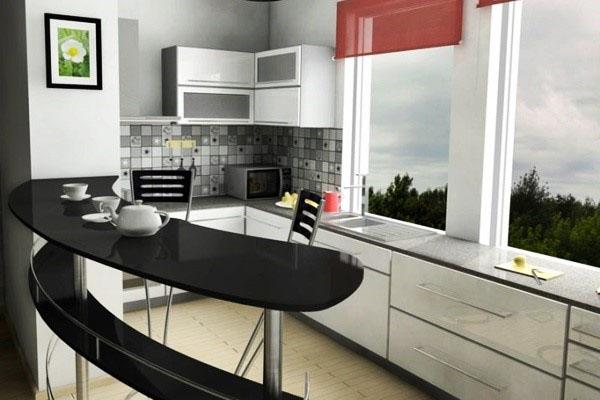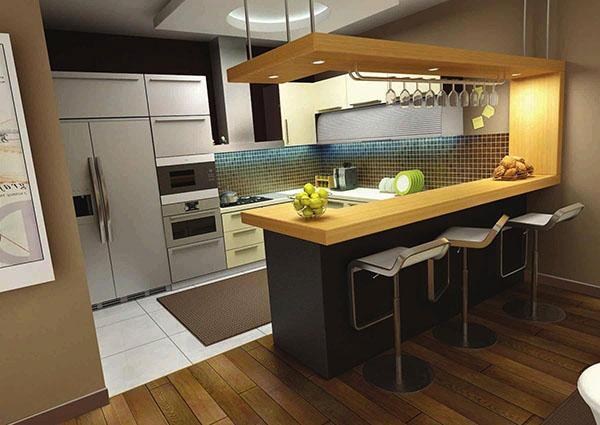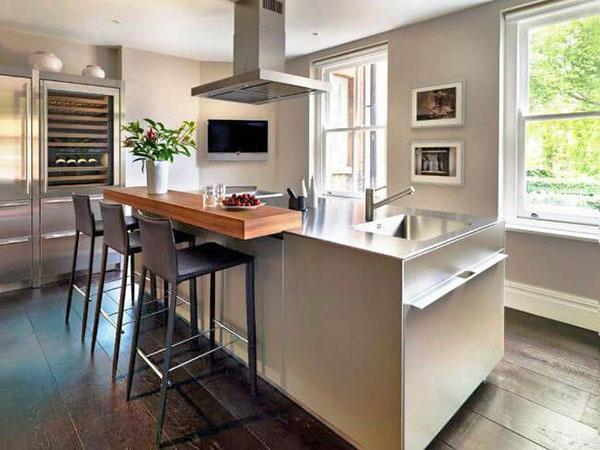Practical and original bar counter for the kitchen
 The bar counter for the kitchen is an original piece of furniture that is suitable even for small spaces. Modern models are distinguished by a variety of shapes and materials of manufacture. This allows you to choose your own design for each style.
The bar counter for the kitchen is an original piece of furniture that is suitable even for small spaces. Modern models are distinguished by a variety of shapes and materials of manufacture. This allows you to choose your own design for each style.
Application advantages

Over time, this piece of furniture migrated to the kitchens of apartments, introducing an element of originality and dynamism. At its core, a bar counter is a high tabletop mounted on supports. The set is complemented by chairs with high legs.
The wide popularity of racks is due to the large number of their advantages:
- modern design;
- convenience;
- functionality;
- the choice of material and design;
- the ability to replace the dining table;
- a large number of types of bar counters;
- the admissibility of the organization even in a small area.
Despite all the advantages, racks are not always chosen as an addition to the interior. They can be inconvenient for older people and not suitable for small children as a place to eat. In addition, such a piece of furniture in an apartment is usually designed for a small number of people and is not convenient for large companies.
Bar counter for the kitchen: types and features
Depending on the layout, area and style of interior design, the types of bar counters for the kitchen are selected. They differ in the following parameters:
- equipment;
- location method;
- material of manufacture;
- the form.
Ostrovnaya
 This type of rack organization is a separately located piece of furniture. Such a rack can only be installed in a large kitchen or in the case of its combination with the living room.
This type of rack organization is a separately located piece of furniture. Such a rack can only be installed in a large kitchen or in the case of its combination with the living room.
It can be a round bar counter made in the shape of the letter "P" or "G". This freestanding headset item should match the style, color and material of manufacture to the rest of the furniture.
If space permits, a kitchen island can combine a counter on one side with a work area on the other.
Built-in
 In this case, the bar counter for the kitchen is a continuation of the countertop or other interior element, even the window sill. The built-in laconic option can be convenient for small rooms, especially if the empty space in front of the window is used.
In this case, the bar counter for the kitchen is a continuation of the countertop or other interior element, even the window sill. The built-in laconic option can be convenient for small rooms, especially if the empty space in front of the window is used.
Partition
 For spacious studio apartments and living rooms, combined with a kitchen, the counter can act as a partition between the kitchen and the recreation area. Often, a countertop for a bar counter is a continuation of a niche protrusion or other furniture that is adjacent to the kitchen side.
For spacious studio apartments and living rooms, combined with a kitchen, the counter can act as a partition between the kitchen and the recreation area. Often, a countertop for a bar counter is a continuation of a niche protrusion or other furniture that is adjacent to the kitchen side.
Leveled modification
 If the working area of the kitchen is adjacent to the bar counter, an option with several levels is chosen. In this case, the working area is located on one of the sides at a lower level. This is a compact and fairly convenient option. Several levels can also be organized by connecting the dining table to the counter.
If the working area of the kitchen is adjacent to the bar counter, an option with several levels is chosen. In this case, the working area is located on one of the sides at a lower level. This is a compact and fairly convenient option. Several levels can also be organized by connecting the dining table to the counter.
Small kitchen: how to choose a bar counter
 Arranging a comfortable space in a small area is always fraught with difficulties. For a small kitchen, the choice should fall on a laconic model with a non-bulky countertop.Usually, due to the fact that the countertop for the bar counter is small, it is designed for no more than two people.
Arranging a comfortable space in a small area is always fraught with difficulties. For a small kitchen, the choice should fall on a laconic model with a non-bulky countertop.Usually, due to the fact that the countertop for the bar counter is small, it is designed for no more than two people.
These can be models in which the rack is located along one of the walls or a folding mechanism is used to remove the table top. Mobile options are made from durable yet lightweight materials that provide strength and ease of use.
Selection of material
When buying furniture or planning to make a bar counter for the kitchen with your own hands, it is important to know the characteristics of the materials that will be used. Their choice depends not only on the appearance of the structure, but also on the cost, the duration of the service life, and also the care of the thing.
Chipboard with lamination

Laminated chipboard (chipboard) has many advantages as the main material for creating a bar:
- affordable price;
- resistance to high temperatures and humidity;
- the ability to select colors with imitation wood, stone.
The strength of chipboard is not the strong point of the material. Therefore, choosing this option, you should expect that the rack will not serve for decades. In addition, the material is not considered environmentally friendly.
A natural stone
 This material is highly decorative. Usually, in addition to bar counters, stone is used to decorate countertops of work surfaces, creating a single ensemble.
This material is highly decorative. Usually, in addition to bar counters, stone is used to decorate countertops of work surfaces, creating a single ensemble.
Material advantages:
- long service life;
- attractive appearance;
- reliability;
- strength.
The disadvantages include the high price and complexity of processing, which are best left to professionals.
Acrylic
 The pliability and flexibility of acrylic often makes the choice of designers in favor of this material. If the creation of unusual shapes is included in the plans, then acrylic, with its glossy sheen, allows you to recreate interesting installations.
The pliability and flexibility of acrylic often makes the choice of designers in favor of this material. If the creation of unusual shapes is included in the plans, then acrylic, with its glossy sheen, allows you to recreate interesting installations.
Glass
 Bar glass is chosen less frequently than other materials. The fragility of the glass and its "coldness" are compensated by its unusual appearance.
Bar glass is chosen less frequently than other materials. The fragility of the glass and its "coldness" are compensated by its unusual appearance.
There is also the option of matching tabletops made of colored glass.
Drywall
 A plasterboard bar is a frequent choice of designers. This material allows you to create designs of the most bizarre shapes. Racks of drywall can be adapted to any style and interior.
A plasterboard bar is a frequent choice of designers. This material allows you to create designs of the most bizarre shapes. Racks of drywall can be adapted to any style and interior.
Wood
 The nobility of natural wood, its beautiful texture and color allow you to design the bar counter as a key element of the kitchen interior. It can be a semicircular bar counter or a traditional one.
The nobility of natural wood, its beautiful texture and color allow you to design the bar counter as a key element of the kitchen interior. It can be a semicircular bar counter or a traditional one.
Valuable wood species are expensive. And working with them requires skills and the availability of the necessary tools.
Brick
 If a brick is chosen for the construction of the base, then the bar from the inside usually does not have functional cavities. This option is one of the most durable and reliable. A structure with a brick base will serve for a long time and can withstand significant loads.
If a brick is chosen for the construction of the base, then the bar from the inside usually does not have functional cavities. This option is one of the most durable and reliable. A structure with a brick base will serve for a long time and can withstand significant loads.
Brickwork as a basis for a bar counter is used in two forms:
- With emphasis on the texture of bricks.
- With subsequent plastering and further processing.
DIY making
 A do-it-yourself bar counter is created according to drawings and diagrams. The table top plays a decisive role in this. It complements the interior and attracts attention. For her, wood, chipboard or other material that can be processed independently is often chosen.
A do-it-yourself bar counter is created according to drawings and diagrams. The table top plays a decisive role in this. It complements the interior and attracts attention. For her, wood, chipboard or other material that can be processed independently is often chosen.
How to fix the bar to the wall is determined by the material of manufacture and the model. In some cases, the rack is a continuation of another design and has a common tabletop with it. In lightweight mobile versions, in which there is a folding tabletop, installation can be carried out using hinges.
For those who do not want to make the countertop itself, there is an opportunity to purchase a finished one, for example, from acrylic stone.
 First, a drawing of the bar is made. And its location is determined.The base of the stand must be reliable, so sufficient care must be taken in its manufacture.
First, a drawing of the bar is made. And its location is determined.The base of the stand must be reliable, so sufficient care must be taken in its manufacture.
Brick
 Brick is textured and beautiful in itself. This allows not to subject it to additional processing. Many styles are based on emphasizing its natural shade and structure. For example, loft, provence and others.
Brick is textured and beautiful in itself. This allows not to subject it to additional processing. Many styles are based on emphasizing its natural shade and structure. For example, loft, provence and others.
The brick bar is a stationary structure based on cement mortar. Often, a red facing brick is chosen for the base.
Drywall
 The plasterboard bar is made on the basis of a metal frame. When working on a project, you can provide for the presence of shelves on one side under the countertop. Drywall allows you to create sleek designs that fit a variety of styles.
The plasterboard bar is made on the basis of a metal frame. When working on a project, you can provide for the presence of shelves on one side under the countertop. Drywall allows you to create sleek designs that fit a variety of styles.
Wood
 Wood is beautiful in itself. The base and worktop made of natural material are attractive in themselves and do not require staining. For processing, tinting and varnish are usually used.
Wood is beautiful in itself. The base and worktop made of natural material are attractive in themselves and do not require staining. For processing, tinting and varnish are usually used.
The wood bar has a long service life and looks chic. Making it independently requires skills in working with carpentry tools.
Most suitable wood species:
- Pine;
- Birch tree;
- oak.
The bar counter in the interior of the kitchen will help save space and give the room originality. Functionality and style make it, while not a must, but a desirable component of the design.